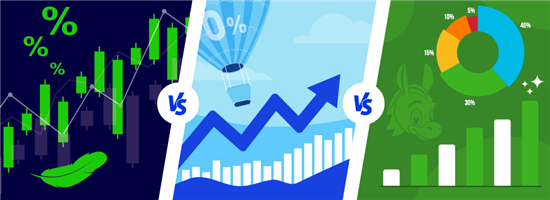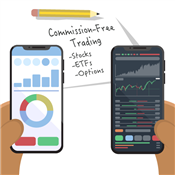Robinhood vs Webull vs Fidelity: Which is Better for You?
Robinhood, Webull, Fidelity - three big investing platforms, but which is best for you? Find out in this detailed comparison guide.
 |
Looking to grow your money or invest for retirement? Robinhood, Webull, and Fidelity could all be viable options.
However, what's best will depend on the type of trading you want to do. It'll also depend on your experience level.
Read on for a full breakdown and direct comparison of each platform.
Fund and Get 4% Match Bonus
Enroll in this offer, and transfer or deposit $100,000 or more to your Webull account. Maintain a total net qualifying funding amount of $100,000 or more until the payment date of the final installment of the match bonus. The match bonus will be paid in 6 installments. The first installment will be issued on or about May 15, 2026.
Who Each Is Best For
- Robinhood is best for investors who are just starting out or don't have a lot of capital to invest. You can trade with as little as $1.[1] And the clean, beginner-friendly UI makes it incredibly easy to get started.
- Webull is best for active traders who like digging into the analytics and charts for their investment decisions. The platform is known for its advanced charting and technical analysis tools.
- Fidelity is best for mutual fund investors and those planning for retirement. It's also good if you're looking for a full-service brokerage. The platform has pretty much every tool, product, and account you'll ever want as an investor.
 |  | ||
| Visit Site | Learn More | Visit Site | |
Robinhood | Fidelity | Webull | |
|---|---|---|---|
Get a Free Stock (worth between $5 and $200) - | Commission-Free Trading - Online Stock, ETF and Option Trades - | Fund and Get 4% Match Bonus - | |
Benefits and Features | |||
| Stock Trading | |||
| Options Trading | |||
| Annual Fee | |||
| Cryptocurrency Trading | |||
| Minimum Deposit | |||
| Mutual Fund Trading | |||
| Inactivity Fee | |||
| Maintenance Fee | |||
| Banking | Offers Robinhood spending account with Robinhood Cash Card issued by Sutton Bank | ||
| Mobile App | |||
| Forex Trading | |||
| Futures Trading | |||
| Trading Platform | Desktop, Web Trading, Mobile Apps | Desktop, Web Trading, Mobile Apps | |
| Fractional Shares | |||
| Visit Site | Learn More | Visit Site | |
Blank fields may indicate the information is not available, not applicable, or not known to CreditDonkey. Please visit the product website for details. Robinhood: Pricing information from published websites as of 01/25/2025. Fidelity: Pricing information from published website as of 07/05/2024. | |||
What All Three Offer
- Commission-free trades
- No minimum investments
- Stocks, options, and ETFs
- Fractional shares that let you buy stocks with just a few dollars
How They're Different
- Fidelity is the only one among the three that offers mutual funds and bonds.
- While all 3 have IRAs, Robinhood is the only one to offer an IRA with a match on eligible retirement contributions.[2]
- Both Fidelity and Webull offer robo-advisor services while Robinhood does not.
- Webull has a paper trading account, while the other two don't.
Now let's take a more detailed look at each one, before going into the head-to-head comparisons.
Why Choose Robinhood?
Robinhood offers 100% commission-free trading. You can invest in stocks, ETFs, options, and cryptocurrencies for as low as $1. This makes it perfect for new investors who want to start with small amounts.
Robinhood also offers the only IRA with an extra match on top of your annual contribution limits.[4] This gives you a nice little boost to your retirement savings.
For more experienced investors, they have a premium account called Robinhood Gold at $5/month. With it, you get margin trading, more advanced research tools, and a better match on your IRA contributions.
Robinhood has over 20 million users. The app is very beginner-friendly and highly-rated on both Google Play and App Store.
Drawbacks:
The biggest drawback of Robinhood is that its research isn't as extensive as the other options.
You get access to professional research from Morningstar with Robinhood Gold, but you'll need to pay their monthly fee for that. Even then, it's not as extensive as Webull's array of tools.
|
|
3% Match on IRA with Robinhood Gold
Earn 3% IRA match on all eligible contributions with Robinhood Gold. Terms and conditions apply. This is a limited-time offer.
1% Match on IRA
Earn 1% IRA match on all eligible contributions to your Robinhood IRA. Terms and conditions apply. This is a limited-time offer.
Why Choose Webull?
Webull is perfect for more advanced, active traders. It offers commission-free trades on stocks, ETFs, and options.[6] This makes it ideal for those who make frequent transactions.
On top of that, they offer widely praised advanced charting tools and stock screeners. They also have great technical analysis tools to help you make your investment decisions.
Webull has features for different types of traders:
- For day traders: Perform up to 3 day trades in a five-trading day period (unlimited for those with $25,000 or more in account balance).[7]
- For margin traders: Get access to margin trading at no extra cost and up to 4x buying power (you need at least $2,000 to qualify).[8]
- For short sellers: Short selling is supported on Webull.
Webull is also the only platform among the three that offers a paper trading account. You get unlimited virtual cash and real-time market data, so you can test your strategies before committing real money.
Drawbacks:
If you're a complete beginner, you may find all the research tools overwhelming. All the charts and screeners could scare you away from trading completely.
|
|
Why Choose Fidelity?
Founded in 1946, Fidelity is the most well-established among the three options. They're one of the biggest investment managers in the world with over 43 million users and over $11 trillion in assets managed.[9]
Fidelity caters to a much broader range of investors compared to Robinhood and Webull. In addition to stocks, ETFs, options, and crypto, Fidelity also offers mutual funds, bonds, and more. The only assets you can't trade are futures and commodities.
You can do most of your trading at little to no cost on Fidelity. They offer online commission-free trades, have no trade minimums, and barely any account fees.
Want to be hands-off? They also have a robo-advisor called Fidelity Go. Fidelity will build a strategy based on your needs, automatically invest in mutual funds for you, and manage your portfolio.
Drawbacks:
Fidelity's in-depth research can be a little overwhelming for beginners. The same applies to their user interface.
Also, Fidelity has more fees compared to the other two platforms. This includes fees on option contracts, broker-assisted trades, and trading services offered via telephone.
|
|
Fidelity can be good for beginners because they offer fractional shares. This allows users to trade stocks and ETFs with small sums of money, minimizing the risk in the process. However, it's worth noting that some of Fidelity's research tools can get a little overwhelming for those just starting out.
Head to Head Comparisons
To give you a better idea of which platform will suit your trading style, here's a direct comparison between Robinhood, Fidelity, and Webull.
Fees
 |  | ||
| Visit Site | Learn More | Visit Site | |
Robinhood | Fidelity | Webull | |
|---|---|---|---|
Get a Free Stock (worth between $5 and $200) - | Commission-Free Trading - Online Stock, ETF and Option Trades - | Fund and Get 4% Match Bonus - | |
| Stock Trading | |||
| Options Trading | |||
| Cryptocurrency Trading | |||
| Annual Fee | |||
| Inactivity Fee | |||
| Maintenance Fee | |||
| Visit Site | Learn More | Visit Site | |
Robinhood: Pricing information from published websites as of 01/25/2025. Fidelity: Pricing information from published website as of 07/05/2024. | |||
All platforms offer commission-free trading. This means that there are barely any trading fees whenever you buy or sell an asset.
They're also all completely free to start using. All you need to do is sign up, create an account, and you're ready to trade.
However, Fidelity may have a bit more fees. For options, Fidelity has a $0.65 fee per contract.[11] Other platforms, like Robinhood, don't charge any options contract fees.[12]
On top of that, Fidelity charges $32.95 for broker-assisted trades, which is higher than most in the industry.[13] If you do a lot broker-assisted trading, you're better off looking elsewhere.
Fidelity also has a $12.95 fee on all FAST trades.
Minimum Investment
None of the three platforms require any minimum investments or account minimums. They also all offer fractional shares. This means you start with as little as a few dollars.
Both Robinhood and Fidelity offer fractional shares for as low as $1. This applies to stocks and ETFs found on both platforms.
Webull offers fractional shares for as low as $5.
A fractional share is a portion of a stock that's less than one full share. These are only available to trade on major brokerages, allowing investors to buy portions of stock with just a few dollars.
For example, let's say Apple's stock (AAPL) is set at $189.69 per share but you only have $10 to invest. Major brokerages will allow you to invest that $10 and receive a portion of a share—in this case, it would be 0.05272 shares.
Ease of Use
Robinhood is the easiest to use for beginner investors. The user interface is incredibly intuitive.
Fidelity takes the "one-stop shop" approach, offering all the tools you'll ever need as an investor. If you're an experienced investor, this'll be heaven for you. However, the sheer amount of options and information may be a bit much for beginners.
Since Webull is geared more toward active traders, it may not be suitable for most beginners. Although they have a paper trading account to practice, the advanced research tools could be a little overwhelming for most just starting out.
Luckily, if you're a beginner, both Webull and Fidelity have robo-advisors. These help you create investment strategies based on your goals and manage your portfolio for you.
Tradeable Assets
| Robinhood | Fidelity | Webull | |
|---|---|---|---|
| Stocks | ✔ | ✔ | ✔ |
| ETFs | ✔ | ✔ | ✔ |
| Options | ✔ | ✔ | ✔ |
| Cryptocurrency | ✔ | ✔ | - |
| Mutual funds | - | ✔ | - |
| Bonds | - | ✔ | - |
| Fixed income funds | - | ✔ | - |
| US Treasuries and CDs | - | ✔ | - |
All three platforms let you invest in stocks, ETFs, and options. However, Fidelity is the only one that offers mutual funds and bonds.
In fact, Fidelity is your best option if you want to invest in mutual funds. They offer over 10,000 funds from hundreds of fund companies, including over 3,000 no-transaction-fee funds (NTFs).[14][15]
If you're new to investing, Robinhood may be a better option for you. The clean, beginner-friendly user interface makes it easy to learn and their cheap fractional shares minimize risks on your first few trades. If you're looking for a more all-around investing platform, Fidelity has a lot more to offer.
Account Types
| Robinhood | Fidelity | Webull | |
|---|---|---|---|
| Individual taxable account | ✔ | ✔ | ✔ |
| Joint account | - | ✔ | - |
| Traditional IRA | ✔ | ✔ | ✔ |
| Roth IRA | ✔ | ✔ | ✔ |
| Margin account | ✔ | ✔ | ✔ |
| 529 College Savings | - | ✔ | - |
| Health Savings Account | - | ✔ | - |
| Account for minors | - | ✔ | - |
| Robo-advisor | - | ✔ | ✔ |
| Cash management account | ✔ | ✔ | ✔ |
| Paper trading account | - | - | ✔ |
Fidelity is the most comprehensive. It pretty much has every type of investment account you'll ever need. This includes bank-like accounts like a Spend and Save account to more niche accounts like a 529 Plan or a Health Savings Account.
However, Robinhood has the edge on IRAs. It offers a match on every eligible contribution to your IRA.
If you want to trade on margin, Fidelity offers margin trading at no extra cost. Webull has margin interest rates based on your margin balance, but if you don't hold margin overnight, you won't be charged interest. Robinhood also charges a margin interest rate based on your margin balance.
Webull is the only one with a paper trading account. This allows you to simulate trades with unlimited virtual money and real-time market data.
Robinhood is better for you if you want an extra match for your IRA contribution. However, if you're more interested in mutual funds, Fidelity is a better option.
Trading Platform
All three platforms let you trade via web browser or mobile app. Webull and Fidelity both also have a desktop app you can download.
Webull Desktop is open to everyone. It's fully customizable so you can set it up the way you want. You can set up watchlists, customize charts with smart drawing tools, place orders, and more.
Fidelity's desktop app is for active traders (called Active Trader Pro®). It's free, but to access it, you need at least 36 trades over a rolling 12-month period.[16]
You can customize with your preferred tools, colors, and font size. The interface is very comprehensive. Get real time news, discover ideas with 45+ market filters, create up to 50 orders, and more.
Webull and Fidelity's platforms are great for active, experienced traders. Beginners will be better off with Robinhood's minimalist platform.
- Robinhood - Robinhood 24 Hour Market, which lets you trade 24/5, is currently rolling out and isn't available to all users yet
- Webull - Pre-market: 4:00-9:30am ET; After-hours: 4:00-8:00pm ET
- Fidelity - Pre-market: 7:00-9:28am ET; After-hours: 4:00-8:00pm ET
Order Types
| Order Type | Robinhood | Webull | Fidelity |
|---|---|---|---|
| Market order | ✔ | ✔ | ✔ |
| Limit order | ✔ | ✔ | ✔ |
| Stop limit | ✔ | ✔ | ✔ |
| Stop loss | ✔ | ✔ | ✔ |
| Trailing stop loss | ✔ | ✔ | ✔ |
| Trailing stop limit | - | ✔ | ✔ |
| One-triggers-the-other (OTO) | - | ✔ | ✔ |
| One-cancels-the-other (OCO) | - | ✔ | ✔ |
| One-triggers-an-OCO (OTOCO) | - | ✔ | ✔ |
Robinhood only provides the basic types of orders. This is why it's better suited for beginners with simpler investment approaches.
Webull and Fidelity, on the other hand, provide more advanced conditional orders. These allow you to set order triggers for stocks and options based on price movement. This gives experienced investors more control over their trades to mitigate risk.
Market orders execute right away, no matter what the price is. Limit orders, on the other hand, will let you set the price and the trade will execute once the share hits that price. This means limit orders aren't guaranteed to be executed, but may get you a better price.
Research Tools
Although their educational and research tools vary in depth, all platforms offer resources for people who want to learn more about investing and/or personal finance.
Robinhood
Because it's made with beginners in mind, Robinhood only has the basic research tools like:
- Side-by-side stock comparisons and stock filters
- Real-time market updates on stocks in your watch list
- Candlestick charts with 5 indicators
- Prices paid by Robinhood investors (per share)
If you have a Gold account, you'll get access to professional research from Morningstar. These include in-depth stock research reports, which cover over 1,700 stocks and are frequently updated.
- Business strategy - Initiatives a company takes to create value
- Economic moat - Ability to maintain an edge over its competitors
- Fair market value - The price the company would sell for on an open market
- Risk - Probability of losing parts or all your investment
- Leadership - The management behind the company
Fidelity
Fidelity offers advanced research and analysis tools such as:
- Quotes on individual stocks, company financial statements, key company statistics, and more
- Key information like a stock's earnings, growth rates, dividend yield, and more (customizable on Active Trader Pro)
- News and research reports
- Screeners for stocks, ETFs, and mutual funds
- Run searches based on your own criteria to help you find securities
- Find research from experts that'll match your investing style and let you see what experts are talking about
- See what's happening in specific markets and sectors, as well as set alerts for position-relevant news[17]
If you qualify for Fidelity's free desktop app, Active Trader Pro, you'll also get more tools you can use, such as:
- Real-Time Analytics: Identify trading opportunities with clear and actionable alerts
- Trade Armor: Visualize risks, define entry and exit strategies, and be alerted of price movements
- Daily Dashboard: Get position-relevant information like news, earnings announcements, and economic events in real time
Fidelity also has a Research & Insight center that has white papers, quarterly market and business cycle updates, investing ideas, and videos for more in-depth research.
Webull
Like Fidelity, Webull also has an extensive selection of advanced research and charting tools. These will help you do in-depth research and better decide which assets fit your methodology. These tools include:
- Real-time market quotes
- Price alerts for stocks on your watchlist
- Stock screeners
- Market data from 5 categories and 100+ exchanges
- Over 50 indicators and more than 60 technical signals
- Analyst ratings
- Video replay (for historical stock price action)
Webull is better if you need advanced research tools or a paper trading account to practice strategies. If you're a beginner, Robinhood's user-friendly interface may be better suited for you.
Security/Compliance
Robinhood, Fidelity, and Webull are all SIPC-insured. This means your account is insured up to $500,000 (including a $250,000 cash limit) in case the brokerage fails.[18]
All three platforms also have supplemental coverage for amounts that exceed SIPC limits. Robinhood and Fidelity use Lloyd's of London, while Webull uses Apex Clearing.
All three platforms also have data encryption, security protocols, and two-factor authentication (2FA) that protect all your private and personal data.
In terms of compliance, all three platforms have regulatory oversight. They all also comply with KYC/AML laws.
Know Your Customer (KYC) refers to checks that companies make to ensure that their customers are who they say they are and aren't a risk to the business. Anti-Money Laundering (AML) refers to the steps that companies take to prevent criminals from transferring funds that came from illicit activity.
Customer Support
All three platforms have available customer support to help you with any concerns or questions you may have:
- Robinhood: 24/7 via live chat and phone[19]
- Webull: 24/7 via email and phone[20]
- Fidelity: 24/7 via virtual assistant and phone; Live chat available Mon to Fri 8am - 10pm ET, Sat & Sun 9am - 4pm ET[21]
MOBILE APP
| Robinhood | Webull | Fidelity | |
|---|---|---|---|
| Google Play | 4.1/5 stars (480,000+ ratings) | 4.3/5 stars (185,000+ ratings) | 4.4/5 stars (123,000+ ratings) |
| App Store | 4.2/5 stars (4.1+ million ratings) | 4.7/5 stars (291,000+ ratings) | 4.8/5 stars (2.1+ million ratings) |
In terms of customer feedback, here are some comments from their app store reviews:
Robinhood
Webull
Fidelity
Bottom Line
All three platforms offer similar services. However, each is suited for a specific type of investor in mind:
- If you're a complete beginner looking to get your start in stocks, ETFs, options, and cryptocurrency, Robinhood could be the way to go.
- If you're a more advanced and/or active trader, Webull has the best charting tools and screeners to suit your fast-paced trading style.
- If you're looking to also invest in mutual funds, Fidelity is your best option for an "all-in-one" platform.
References
- ^ Robinhood. How To Start Investing For As Little As 1 Dollar, Retrieved 10/30/2023
- ^ Robinhood. IRA Match FAQ, Retrieved 10/30/2023
- ^ Robinhood. 2022 Annual Report, Retrieved 10/16/2023
- ^ Robinhood. IRA match FAQ, Retrieved 10/16/2023
- ^ The New York Times. Robinhood is fined $70 million over misleading customers and system outrages, Retrieved 10/16/2023
- ^ Webull. What Are The Trading Fees On Webull? Are You Commission Free?, Retrieved 10/30/2023
- ^ Webull. What's The Difference Between Margin And Cash Account?, Retrieved 10/30/2023
- ^ Webull. Margin Trading, Retrieved 10/30/2023
- ^ Fidelity. We Are Fidelity, Retrieved 10/16/2023
- ^ Fidelity. Straightforward pricing, Retrieved 12/10/2023
- ^ Fidelity. Commissions, Margin Rates, and Fees, Retrieved 10/30/2023
- ^ Robinhood. About Options, Retrieved 11/01/2023
- ^ Fidelity. Brokerage Commission and Fee Schedule, Retrieved 10/16/2023
- ^ Fidelity. Mutual Funds Overview, Retrieved 10/16/2023
- ^ Fidelity. Mutual Funds Research, Retrieved 10/16/2023
- ^ Fidelity. How to Add Active Trader Pro®, Retrieved 11/19/2023
- ^ Fidelity. Investment Research, Retrieved 10/30/2023
- ^ SIPC. Investor Protection, Retrieved 10/16/2023
- ^ Robinhood. How to contact support, Retrieved 11/16/2023
- ^ Webull. How to File an Inquiry?, Retrieved 11/16/2023
- ^ Fidelity. Contact us, Retrieved 11/16/2023
Fund and Get 4% Match Bonus
Enroll in this offer, and transfer or deposit $100,000 or more to your Webull account. Maintain a total net qualifying funding amount of $100,000 or more until the payment date of the final installment of the match bonus. The match bonus will be paid in 6 installments. The first installment will be issued on or about May 15, 2026.
$20 Investment Bonus
- Open an Acorns account (new users only)
- Set up the Recurring Investments feature
- Have your first investment be made successfully via the Recurring Investments feature
Invest in Real Estate with $10+
- Only $10 minimum investment
- Get a diversified portfolio of real estate projects across the US
- Open to all investors
Write to Iggi Vargas at feedback@creditdonkey.com. Follow us on Twitter and Facebook for our latest posts.
Note: This website is made possible through financial relationships with some of the products and services mentioned on this site. We may receive compensation if you shop through links in our content. You do not have to use our links, but you help support CreditDonkey if you do.
|
|
|
Compare:





